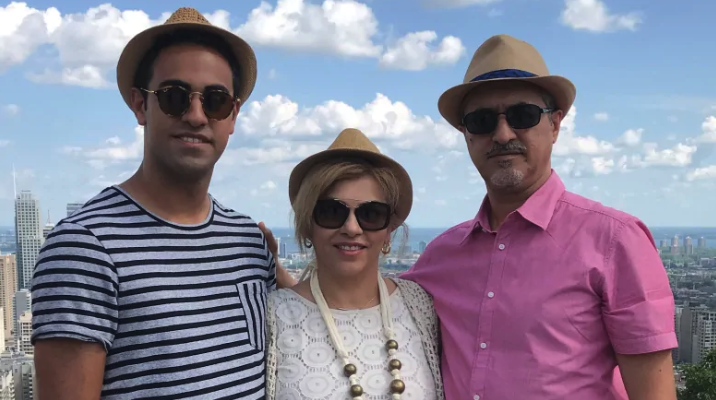July 24, 2020

citizen, was not allowed into the US because he once served in the Iranian
Army. His son, Amirali (left), had to drive alone to Washington, DC, to get
papers so the men could attend the funeral of their wife/mother, Neda Sadiqi
(center), who was killed in the shootdown of the Ukrainian passenger jet.
When Iranian-born Canadian citizen Farzad Alavi was denied entry to the US January 10, he said a border officer told him the reason was his past mandatory military service in Iran — which the officer claimed effectively linked him with terrorists.
“They’re telling me I’m a member of a terrorist organization. It’s very, very difficult for me to digest,” Alavi told the Canadian Broadcasting Corp. “They told me never try to enter the States again.”
At the time, Alavi had just suffered a horrific loss. Two days before, his wife, Neda Sadighi, was killed when the Pasdaran shot down her plane after it took off from Tehran.
A grieving Alavi was travelling to the US from Toronto with his son, Amirali, who needed a special passport stamp from the Iranian consular offices in Washington, before he could attend his mother’s memorial service in Iran. There is no Iranian consulate in Canada.
“We were already devastated,” said 27-year-old Amirali about his mother’s sudden death. “Then the [border] incident happened. It kind of broke us down.”
Alavi is one of half-a-dozen Iranian-born Canadian citizens CBC News interviewed who were denied entry to the US following the assassination of Maj. Gen. Qassem Soleymani.
Alavi, 55, said he and his son were held for about four hours at the US border post in Niagara Falls where they were fingerprinted, had their mobile phones searched, and were questioned about political views and military service.
Alavi said he stressed to border officers that he had no choice when — three decades ago — he was conscripted for his two-year military service. ”I explained that this was not something that I had any power, any control over.”
Alavi, who was an orthopedic surgeon in Iran, said his obligatory service was spent working as a doctor serving patients. ”I’m not a terrorist. The whole of my life, I’ve saved people’s lives.”
Alavi and his family left Iran in 2010 for a safer life in Toronto, he said.
US Customs and Border Protection (CBP) confirmed Alavi was denied entry, but declined to discuss why. It did say that his “in-depth inspection” took about 1-1/2 hours, which is average.
“CBP takes an admissibility decision seriously,” said spokesperson Aaron Bowker in an email. “The burden of proof regarding admissibility is on the traveler.”
Along with cases of being denied entry, half-a-dozen other Iranian-born Canadian citizens told CBC News that — following Soleymani’s assassination — they were held and questioned at the US border, sometimes for hours, before being allowed to enter the US.
Professor Edward Alden said he believes the US has cast too wide a net with its post-assassination screening measures.
“This is exactly what happened after 9/11,” said Alden, a professor of US-Canada Economic Relations at Western Washington University in Bellingham, Washington.
“You have these kinds of wide-ranging, pretty indiscriminate screening policies, and they do nothing to identify or keep terrorists out of the United States. But they cause considerable inconvenience and sometimes great harm to a lot of innocent travelers.”
While Alavi was denied entry to the US, his son, Amirali, was allowed to enter the country. Amirali left Iran before he had to serve in the military and, like his father, is a Canadian citizen.
The two men had planned to share the 650-kilometer drive to Washington, and now Amirali had to make the journey alone — at 1 a.m., on icy roads — so he could get to the consular offices in time before their flight to Iran.
“I was worried,” said Alavi, near tears. “I lost my wife. If something happens to [my son], what am I going to do?”
Amirali made it to Washington safely and both father and son were able to fly to the memorial service in Iran. But, as far as Alavi understands, he still can’t enter the US.
“There’s no clear reason for my dad to be a threat to homeland security in the States,” said Amirali, who’s a law student at the University of Toronto. “It’s unreasonable what they’re doing and they must be accountable.”
Alavi said he plans to visit the US consulate in Toronto to argue his case because, most importantly, he can’t accept being labeled a member of a terrorist group.
“What they told me, what they called me, this is … intolerable.”
Meanwhile, Ukraine said the investigation into the downing of the Ukrainian jet carrying Alavi’s wife is going nowhere. Rustam Ryaboshapka, Ukraine’s prosecutor general, said March 2 that all talks over the crash have halted since Iran has become overwhelmed by the coronavirus outbreak—although aviation investigators shouldn’t be shifted to the coronavirus issue.
The CBC in Canada also reported that there is growing speculation that Iran failed to close its skies to civilian flights when it attacked American troops in Iraq and anticipated US retaliation because it didn’t want to lose the overflight fees it charges foreign airlines. As a result of the shootdown, however, many airlines have shunted their planes around Iran so that the country has lost much of the overflight revenues it used to earn.
Iran’s airport authority said it earned $140 million from overflight fees in the last Persian year.